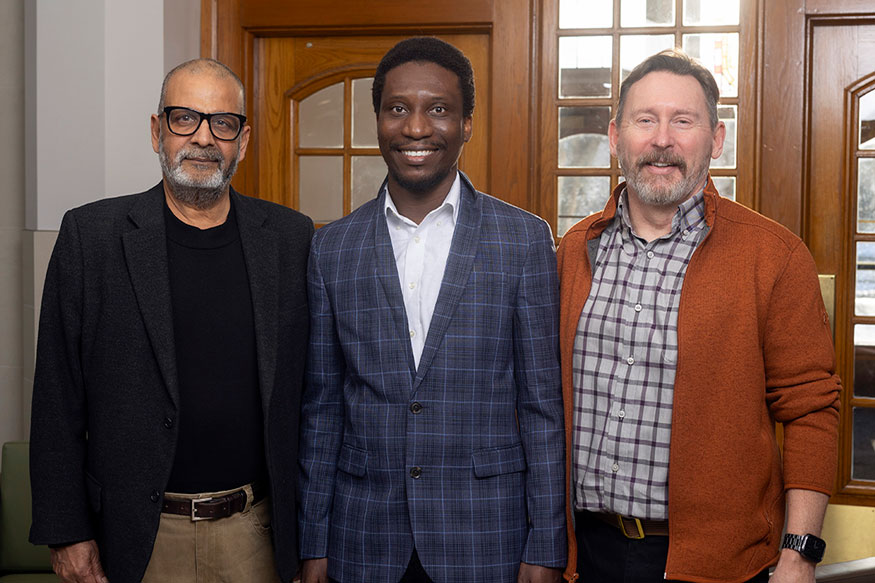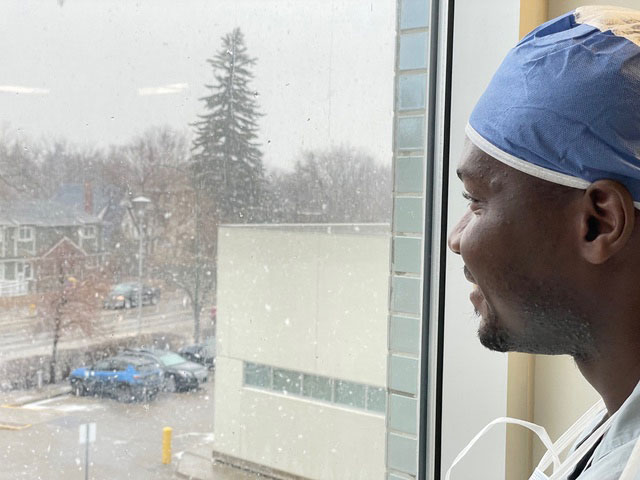
Global training fellowship improves care across the globe
A new fellowship at the University of Saskatchewan (USask) is helping address health needs across the world.

The Global Orthopedic Surgery One-Year Training Program provides specialized training for physicians, giving them the skills needed to improve care in their communities. The program is directed toward orthopedic residents training in under-resourced areas of the globe.
Dr. Peterly Philippe (MD) from Haiti is the inaugural fellow in the program. He was actively engaged in both learning and providing clinical service in Saskatoon from September 2023 to August 2024. Philippe has now returned to his home country to practice and teach orthopedic surgery.
"This fellowship has been a wonderful experience, offering me invaluable learning opportunities and fostering global collaboration to improve surgical care in Haiti," said Philippe.
The Global Orthopedic Fellowship began as a joint endeavor between the Broken Earth Charity and the Postgraduate Medical Education (PGME) Office at USask’s College of Medicine. Its purpose is to provide opportunities for learning, development, and collaboration between learners and faculty, while also extending the reach of local medical education to support global health needs.
A second fellow, Dr. Fevry Desire (MD) began his training program this September.
"This program is the biggest opportunity in my career as a Haitian Orthopedic Surgeon. It allows me to acquire a lot of new knowledge, perfect my skills,and achieve and maintain good connections with Canadian physicians," he said.
Dr. Huw Rees (MD’86), a well-known and highly regarded orthopedic surgeon in Saskatoon, laid the groundwork for this fellowship through his connections and humanitarian work with residents, surgeons, and Team Broken Earth.
Team Broken Earth was created in response to the devastating earthquake in Haiti in 2010 and is a volunteer-driven registered Canadian medical charity. The organization is a network of compassionate volunteers who are committed to sending medical and surgical teams to under-resourced countries around the world. Team Broken Earth provides medical and surgical relief missions designed to deliver long-term longitudinal care and educational opportunities while promoting professional liaisons with healthcare workers across the globe.
Rees became a part of Team Broken Earth in 2016 as the team lead for Team Broken Earth Saskatoon. Since then, along with his wife Dr. Henrike Rees (MD), has orchestrated several missions to Bernard Mevs Hospital in Port au Prince, Haiti. Mission teams have typically included 20-30 physicians, nurses, and allied health care professionals from across Saskatchewan and Canada. Over the years, at least 60 team members have been included in the relief efforts.
These surgical missions allowed the development of meaningful relationships with Haitian physicians. The relationships evolved into a global orthopedic observership program, which began in 2017 as a four-week learning opportunity and allowed residents to spend two weeks each in the Maritimes and Saskatoon. However, due to the volatile political situation in Haiti and the global COVID-19 pandemic, both Team Broken Earth missions and the observership program were suspended from 2019 to 2021. It was re-established in Saskatoon in 2022 as a six-week program, and was a stepping stone to ultimately establishing the formal one-year global orthopedic surgery fellowship in 2023. The overall process took approximately eight years.
“The story of this one-year fellowship is a real and tangible example of successful collaboration and the evolution of coalitions between medical organizations and communities,” said Dr. Anurag Saxena (MEd’10) who led the collaborative efforts locally to establish this fellowship. "It is aligned with USask’s aspiration to be, ‘the university the world needs.’ “
The PGME office worked with the College of Physicians and Surgeons of Saskatchewan to make this fellowship come to fruition. To ensure the highest standards of patient safety, the CPSS changed their by-laws to allow the PGME office to assess the competence of the trainees in lieu of national examinations. CPSS’ decision reflected the confidence in USask’s supervision and assessment processes. The Canadian Medical Protective Association, the Department of Surgery, Orthopedics Division and the orthopedic residency program provided their expertise and support for this fellowship.
This work reflects a collaborative commitment to advancing medical education and global health through USask. The fellowship is offered in the current academic year with partial financial supports from the Saskatchewan Orthopedic Association and the College of Medicine. Continued financial and organizational support is essential to sustain these vital programs and ensure that future trainees can benefit from these unique opportunities that merge medical expertise with global humanitarian efforts.
Article originally published at https://medicine.usask.ca


